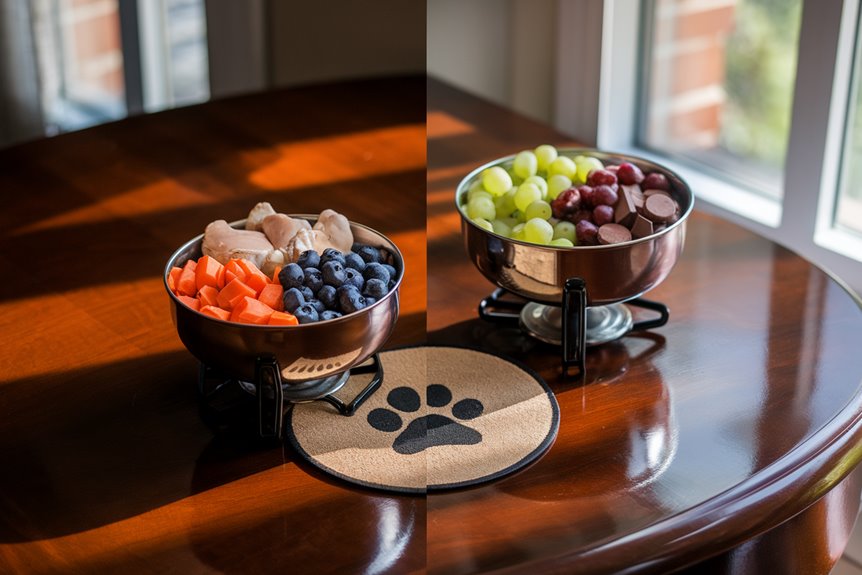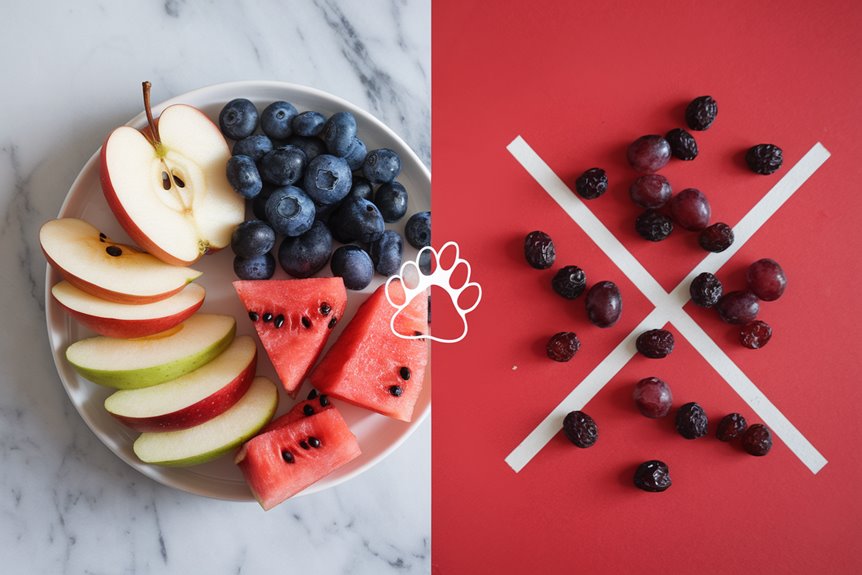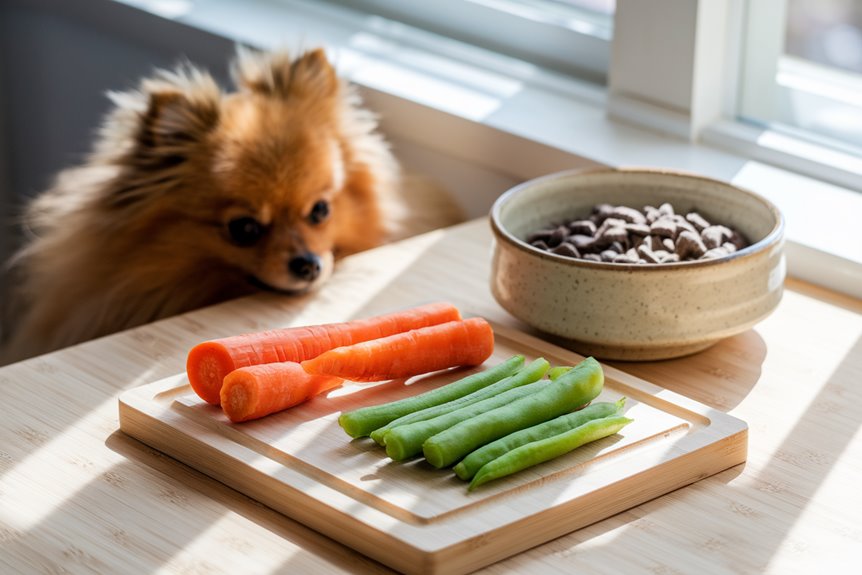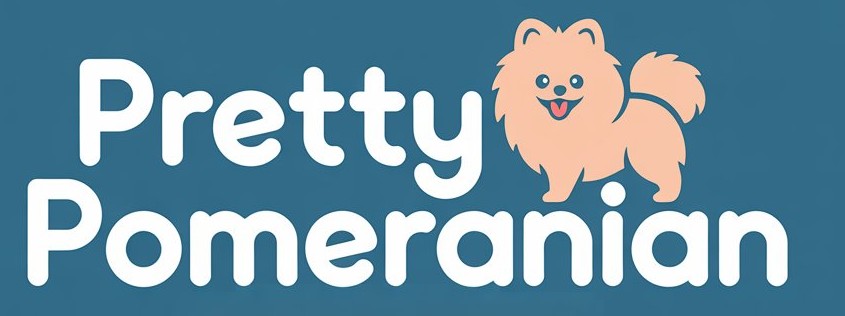Want to keep your little Pom happy and healthy? You can give them yummy treats like small pieces of apple (just take out those seeds!), blueberries, bananas, and carrots – they're packed with good stuff your pup needs.
But watch out! Some foods are really bad news: stay away from grapes, raisins, onions, garlic, avocados, and anything with xylitol – these can make your Pom super sick or worse.
Just remember to keep treats to about 10% of what they eat each day. Give fruits and veggies a good wash first, and don't forget to get rid of seeds and tough peels.
Once you know what's good and what's not, your Pom will be one happy, healthy little fluffball!
Understanding Pomeranian Nutritional Needs

Keeping your Pom healthy means getting their food just right! While regular dog food is the main thing they need, you can mix in some fruits and veggies to give them extra vitamins and good stuff that helps them stay in top shape.
Since these little fluffballs can easily pack on extra pounds, you'll want to stick to healthy snacks that won't make them chubby. Fresh fruits and veggies are great for keeping their sugar levels steady and helping their tummy work properly. Just remember – treats should only be a tiny part of what they eat each day (no more than 10%!). Take it slow when trying new foods – you don't want any upset stomachs or allergic reactions! It's always a good idea to check with your vet before switching up your Pom's meals to make sure they're getting exactly what they need.
Try serving treats in puzzle feeders to make snack time more fun and engaging for your Pomeranian.
Benefits of Fresh Produce
Fresh fruits and veggies can take your Pom's meals from basic to amazing! These healthy add-ons pack tons of vitamins, minerals, and antioxidants that help your furry friend fight off sickness and keep their fur looking shiny and beautiful. Plus, all that fiber helps keep their tummy happy and their bathroom habits regular.
Want a better option than store-bought treats? Fresh produce is perfect! It's super low in calories, so your pup can snack without getting chubby. Fruits and veggies are also full of water, which is great for keeping your Pom hydrated, especially when it's hot outside. Just watch what you give them – stuff like apples, carrots, and blueberries are totally fine, but stay away from grapes, onions, and avocados since they're dangerous for dogs. Take it slow when trying new foods, and keep the portions tiny – treats should only be about 10% of what your Pom eats each day. Try mixing vegetables with low-sodium chicken broth to make them more appealing to your picky Pomeranian.
Safe Fruits for Pomeranians

Hey, if you want to give your Pom some yummy fruits, you've got plenty of great options! Your furry friend can totally enjoy apples (just take out those seeds), blueberries, and bananas – just don't go overboard with them. These tasty treats pack some awesome health benefits like vitamins, minerals, and antioxidants, plus they help keep your pup hydrated.
Just start small when you're trying out new fruits with your Pom – give them tiny pieces at first to see how they handle it. Make sure you get rid of any seeds, pits, or tough peels that could make them choke. Keep in mind that treats (including fruits) shouldn't be more than 10% of what your Pom eats each day. And don't forget to give those fruits a good wash to get rid of any yucky stuff like pesticides or dirt.
Got a Pom with diabetes or other health stuff going on? Better check with your vet first about giving them fruits – some might mess with their blood sugar or cause other problems with their condition. Since Pomeranians can develop hypoglycemia symptoms like weakness and disorientation, monitoring their sugar intake from fruits is especially important.
Dangerous Foods to Avoid
Just a heads up about some stuff that could make your Pom super sick! Stay away from grapes and raisins – they can mess up your pup's kidneys big time. And watch out for onions and garlic too – they'll wreck your dog's red blood cells. Oh, and those fancy avocados? Big no-no since they've got this thing called persin that's bad news for dogs.
Skip the cherries (those pits are packed with cyanide), and don't even think about letting your pup munch on mushrooms – they can be super poisonous! Other stuff to keep away from your furry friend includes chocolate, macadamia nuts, and anything with xylitol in it. If your Pom sneaks any of these foods, call your vet right away – don't wait around! And while you're at it, skip giving them anything with extra sugar, fake sweeteners, or strong seasonings – their tummy won't thank you for it!
Safe Vegetable Options

Hey, feeding your Pom veggies can make their meals way healthier – just gotta pick the right ones! Safe options like carrots, green beans, sweet potatoes, and cooked asparagus are great choices. They're packed with good stuff like vitamins, minerals, and fiber, plus they won't pack on extra pounds.
Just make sure to give those veggies a good wash and chop them into tiny bits so your pup won't choke. You'll need to cook the harder stuff like carrots and sweet potatoes to make them easier on your Pom's tummy. Skip the seasonings, oils, and butter though!
Start slow when you're adding new veggies to your pup's meals, and keep it small – they should only be about 10% of what your Pom eats each day. If your furry friend gets an upset stomach or shows any weird reactions, stop giving them that veggie and check with your vet.
Serving Sizes and Preparation
You want to be careful with how much fruits and veggies you give your Pom. Since they're such tiny pups, make sure to cut everything into super small, bite-sized pieces so they don't choke. Just remember – treats should only be about 10% of what they eat each day.
Give all your produce a good wash to get rid of any yucky stuff like pesticides and dirt. Take out seeds, pits, and tough peels that might hurt your pup. You can feed them most veggies raw or slightly cooked – cooking actually makes them a bit easier on their tummy. Skip any spices, salt, or oils though!
When you're trying out new fruits or veggies with your Pom, start small and keep an eye on how their belly handles it. Pop any leftover treats in the fridge in a sealed container, but toss them after a couple of days if they haven't been eaten – nobody likes old treats! Regular inspection of chewable treats helps ensure your Pom's safety by catching any wear and tear before it becomes dangerous.
Dietary Changes and Health Monitoring
Making diet changes for your Pom is pretty important, but don't worry – just take it slow and keep an eye on how they're doing. Watch out for any upset tummy, throwing up, or if they're not eating like usual. If you spot these signs, just stop giving the new food right away and get in touch with your vet.
Here's what works:
- Go super small at first – just try a tiny bit (like 1-2 pieces) of one new fruit or veggie
- Hold off for a couple days (about 48 hours) before trying something else new – this way you'll know what's causing any problems
- Write down how your Pom handles each new food – you know, like how their poop looks and if they're acting peppy or not
- Make a list of foods that work well for your pup – it'll come in handy later
Just remember to stick to their usual meal times, and don't go overboard with treats – they shouldn't be more than 10% of what they eat each day. Young Pomeranian puppies should get ¼ to ½ cup of high-quality puppy food divided into 3-4 daily meals.
Frequently Asked Questions
Can Pomeranians Eat Frozen Fruits and Vegetables as Summer Treats?
Totally fine to toss your pup some frozen fruits and veggies when it's hot outside! Keep it simple with stuff like apple chunks, blueberries, or baby carrots. Just remember to stay away from the dangerous ones like grapes or onions that can make your dog sick.
How Long Can Cut Fruits and Vegetables Be Stored for Pomeranians?
Hey, if you want those cut fruits and veggies to stay good for your Pom, keep them in the fridge for just 3-4 days tops in a sealed container. Your best bet is to only cut up small amounts when you need them – that way they'll stay super fresh for your furry friend!
Should Fruits and Vegetables Be Organic for Pomeranians?
You don't really need to go all-organic with fruits and veggies for your Pom. Just make sure to give regular produce a good wash before feeding it to your pup. What matters most is that you're giving them fresh, clean fruits and vegetables, whether they're organic or not.
Can Pomeranians Eat Fruit and Vegetable Peels?
Most fruit and veggie peels need to come off before giving them to your Pom. While your pup can handle some peels just fine (like the skin on apples), others might upset their tummy or even be dangerous. It's better to play it safe and peel most fruits and veggies first.
Are Fruit-Flavored Dog Treats as Healthy as Fresh Fruits?
Fresh fruits beat fruit-flavored dog treats any day when it comes to being healthy! These treats usually pack in extra sugars, fake flavors, and chemical stuff to make them last longer. Real fruits are the way to go – they're packed with good-for-your-dog nutrients, fiber, and moisture, without any of that junky extra stuff mixed in.
